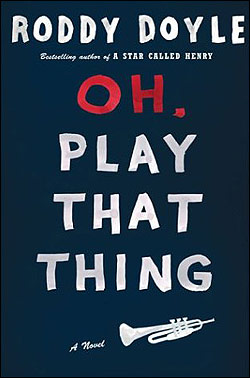Oh, Play that Thing By Roddy Doyle (Viking, $16.97)
It must be tempting to write about New York of the 1920s. Long before the average cost of an apartment hit $1 million and Mayor Michael Bloomberg banned smoking in bars, Gotham was America’s urban OK Corral. Gin runners shot and stabbed one another over territory. Speakeasies hired heavies to man the doors. It was a dangerous, mean, dirty place, and the folks who lived there had to scrap and crawl to get to the top.
In other words, it is the perfect place for Henry Smart to feel at home. When we last saw the hero of Roddy Doyle’s “The Last Roundup” trilogy, he was on the run from IRA assassins. Oh, Play That Thing, the latest installment, opens with Smart arriving at Ellis Island—like so many Irish at that time—with nothing but the shirt on his back and his wits to live by. This raucous, out-of-control accordion of a book plays the picaresque tune of his adventures.
The problem is once Doyle hums a few bars, the song sounds a little familiar. Henry Roth and E.L. Doctorow, among other American novelists, have already written extraordinary novels about life on the Lower East Side around this period. Thing feels like a research project by comparison. Smart attempts to squeeze his way into the marketing business, and he gets squeezed right back out by gangsters and citizens alike.
It isn’t until Smart winds up in Chicago—and blarney meets the blues—that this windy novel earns back a bit of its heft (not to mention bravado). Smart discovers legendary trumpet player Louis Armstrong, still struggling to get out from behind his band. The jazz musician needs a white man to make him legitimate; Smart needs a cause to attach himself to. As a result, the two fall into a friendship as fast and furious as Armstrong’s cornet licks.
Readers familiar with The Commitments know Doyle can blow with the best of them. His prose can bop and bang to punk or bump and grind to the blues. Here, Doyle honors Armstrong’s tunes with sentences as ornately cool and debonair as Armstrong himself. “Sweet and Low Down,” for example, “was like a quick creep up the stairs; that was how these men were playing it, shoes off, before the light came on and caught us.”
Like Albert Murray, who brought to life Duke Ellington in his novel The Seven League Boots, Doyle is never starstruck by the famous musician walking around his pages. His Armstrong is twinkle eyed and wicked, hugely talented, a lover of women too suave to be called a lothario. But most of all, he simply wants to blow that horn, and Smart’s job is to make sure he gets paid well for doing it.
Like Murray, Doyle understands that becoming an American—whether you’re black or Irish—is a game of improvisation, just like jazz. Murray called this syncopation—or the “also and also” of American life. It’s an appropriate phrase for this book as well. Smart can never stop running—or reinventing himself— because people from his past are still trying to kill him.
And here’s where Doyle runs into problems. When he has Louis Armstrong on the page, Thing sounds like a hit. But when Smart has to run again, there is simply too much “also and also” to this book. In the end, he simply wears us out. JOHN FREEMAN
Roddy Doyle will appear at Benaroya Hall (200 University St., 206-621-2230, $10–$25), 7:30 p.m. Nov. 15.
He’s Just Not That Into You By Greg Behrendt and Liz Tuccillo (Simon Spotlight Entertainment, $13.96)
Men are cowardly jerks, and women are delusional morons. There, I’ve just saved you 14 bucks. How? Because that’s the point this 166-page-book- that-shoulda-been-a-paragraph makes over and over and over again.
The authors—alumni of that extremely, ahem, realistic Sex and the City show—have come up with an explanation for every manner of irresponsible male behavior, from the benign to the truly aberrant: “He’s just not that into you.” Their advice for dealing with these cads: “Don’t waste the pretty.” Barf.
At best, this tiny tome should’ve been a Cosmo article—and a dopey one, at that. Once again, women are portrayed as the neurotic yet well-meaning victims of big bad men who only want to get into their panties and do them wrong. Snore. Guess what? Assholes come in both sexes.
But not everyone shares this opinion. Best-seller-maker Oprah fully embraced the book, trotting the authors out at least twice, though only Greg Behrendt—the self- described former jerk turned husband and dad—was allowed to sit onstage, while his female co-author, Liz Tuccillo, was relegated to the cheap seats. The resultant publicity “clitstorm” forced their publisher to up the original print run of 30,000 to 400,000. (As though recent election results weren’t enough to convince the world that our country’s cornered the market on stupid.)
The near-universal swoon this book produced made me curious as to its effectiveness. Currently off the market, I reckoned its advice would hold true for a male/female relationship of any variety. After my dad finally returned my call three days after I placed it, I knew exactly what to say: “Listen, mister, you’re too late—a man who cared would’ve called back within hours.” I thought I heard some yelps of protest as I slammed the phone down, but I was a new woman, not about to waste my pretty on a parent who’d obviously been too “busy” (author’s translation: “too much of an asshole”) to return his daughter’s call. Buh bye. JUDY MCGUIRE




